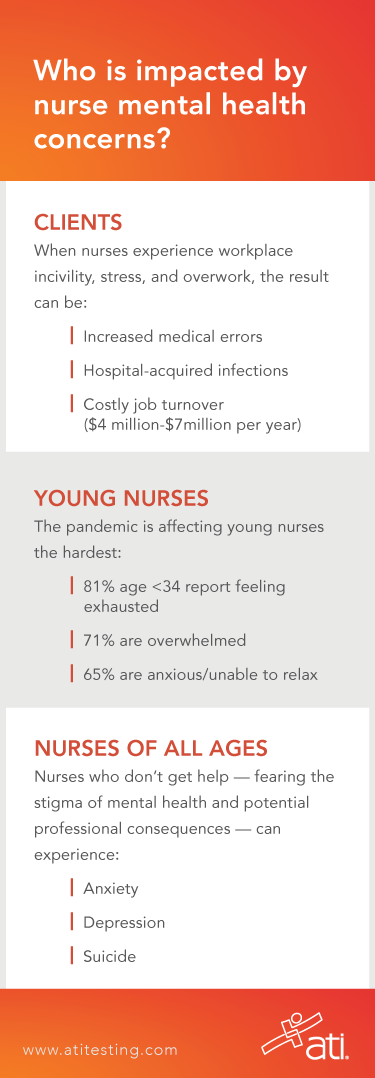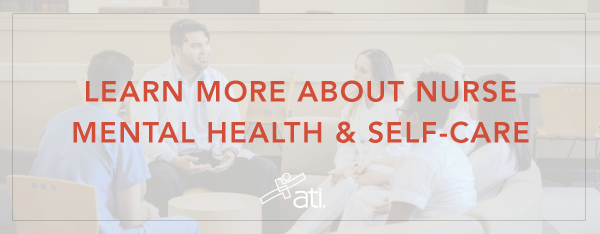YOU CAN TAKE STEPS NOW TO MANAGE NURSE MENTAL HEALTH
YOUR 1ST STEP TOWARD IMPROVING NURSE MENTAL HEALTH STARTS WITH EDUCATING YOUR STUDENTS
 Some day — hopefully sooner than later — “Nurses eat their young” will no longer be a common figure of speech within the nursing profession. That’s because nurse educators are beginning to speak out about the negative consequences of an unhealthy work environment.
Some day — hopefully sooner than later — “Nurses eat their young” will no longer be a common figure of speech within the nursing profession. That’s because nurse educators are beginning to speak out about the negative consequences of an unhealthy work environment.
Specifically, in a survey of 300 educators in 2018, 46% said incivility was a problem at their schools. After conducting this survey, ATI team members Sandra Annesi, DNP, Vice President, NCLEX Services, and Susan Yowler, MSN, RN, CNE, Online Review Products Manager, knew they needed to take action.
LEARN MORE ABOUT NURSE MENTAL HEALTH & SELF-CARE

They turned to colleague and civility expert Cynthia Clark, PhD, RN, ANEF, FAAN, who helped them create a civility action plan. The result? 92% of those surveyed who implemented the plan said they felt better equipped to handle incivility.
NURSE MENTAL HEALTH HAS FAR-RANGING NEGATIVE IMPACTS
These educators’ efforts are a step in the right direction. Unfortunately, incivility is just one issue impacting nurses’ mental health. Stress and overwork have become major challenges with devastating consequences. Specifically, these issues have led to increased medical errors, hospital-acquired infections, and costly job turnover ($4 million-$7million per year).

What's even more unfortunate is that studies show RNs and nursing students typically don’t seek support even when they know they need it. The reasons? Fear of the stigma of mental health and potential professional consequences. But when they don’t ask for help, nurses not only put clients at risk but also themselves. Research shows the tragic results of inaction include increasing depression, anxiety, and suicide.
NURSE MENTAL HEALTH BEGINS WITH STUDENTS
Another ATI colleague who is also an expert in the area of resilience, Teresa (Tese) Stephens, PhD, MSN, RN, CNE, reminds us that:

- While adversity can be painful, it builds resilience.
- Change is inevitable, but you decide whether to become bitter or better.
- Only you can control your future response to challenges.
Nurse educators can make a difference in these outcomes. By addressing students’ mental health while the students are still in nursing school, educators can help change 2 existing — and quite critical — facts:
- Negative stigmas typically begin during school.
- The pandemic is affecting young nurses the hardest. 81% age <34 report feeling exhausted; 71% are overwhelmed; and 65% are anxious/unable to relax.
The 1st step is to find guidance, which the internet makes easy; a Google search for “self-care” yields 15.5 billion results. The bigger challenge is actually implementing the advice. Whatever actions you suggest to your students or peers, however — whether exercise, support groups, mindfulness, or meditation — remember to follow your own advice. You need self-care too.
ADDRESS NURSE MENTAL HEALTH WITH AN ACTION PLAN

If incivility is one of the challenges impacting nurse mental health at your institution, look to the advice of former ATI Strategic Nursing Advisor and civility expert Dr. Cynthia Clark. An expert on the topic — she is the founder of Civility Matters and author of numerous books and articles on the topic — she suggests:
- Develop civility norms — a framework for working and collaborating with and learning from one another.
- Share your norms with learners and stakeholders.
- Identify strategies to address incivility.
- Create a civility toolbox for effective communication skills, such as encouraging staff to:
- Engage in meaningful conversations.
- Actively listen.
- Show genuine interest in others.
- Negotiate conflict successfully.
BUILD RESILIENCE TO IMPROVE NURSE MENTAL HEALTH
Another ATI colleague who is also an expert in the area of resilience, Teresa (Tese) Stephens, PhD, MSN, RN, CNE, reminds us that:
- While adversity can be painful, it builds resilience.
- Change is inevitable, but you decide whether to become bitter or better.
- Only you can control your future response to challenges.
TAKE SOME STEPS TO IMPROVE NURSE MENTAL HEALTH
- Find simulations to teach students about civility at atitesting.com/civility-mentor.
- Discover a new ATI resource addressing mental health: Major depressive disorder (RN mental health), a scenario in ATI’s Real Life Clinical Reasoning Scenarios. Students who use this module benefit by developing emotional connections with realistic clients. They can practice making decisions — and mistakes — that directly impact client outcomes in safe, simulated environments. Simultaneously, they increase their decision-making skills and confidence.
REFERENCES
- Annesi S, Yowler S. Got civility? A step-by-step framework for your organization. Oral presentation at: National Nurse Educator Summit. Oct. 2021.
- Davies EB, Morriss R, Glazebrook C. Computer-delivered and web-based interventions to improve depression, anxiety, and psychological wellbeing of university students: A systematic review and meta-analysis. Journal of Medical Internet Research. 2014;16(5),18–39. doi: https://doi.org/10.2196/jmir.3142.
- Porath C, Boissy A. Frustrated patients are making health care workers’ jobs even harder. Harvard Business Review. May 14, 2021. Accessed Nov. 3, 2021. https://hbr.org/2021/05/frustrated-patients-are-making-health-careworkers-jobs-even-harder.
- Santarnecchi E, D’Arista S, Egiziano E, et al. Interaction between neuroanatomical and psychological changes after mindfulness-based training [published correction appears in PLoS One. 2015;10(6):e0129754]. PLoS One.2014;9(10):e108359. Published Oct. 20, 2014.doi:10.1371/journal.pone.0108359.
- Stephens T. Discover valuable resilience tips you need to prepare for 2021. Atitesting.com. Accessed Nov. 3, 2021. www.atitesting.com/educator/blog/knowledge/2020/12/02/resilience-tips-for-2021.
- Williams H, Simmons LA, Tanabe P. Mindfulness-based stress reduction in advanced nursing practice: A nonpharmacologic approach to health promotion, chronic disease management, and symptom control. J Holist Nurs. 2015;33(3):247-259.doi:10.1177/0898010115569349

ARE YOU TEACHING STUDENTS ABOUT SELF-CARE? SHARE WHAT YOU’RE DOING IN THE COMMENTS BELOW.
